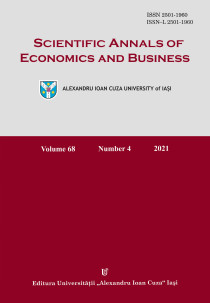Artificial Intelligence and Economic Growth: A Theoretical Framework
Artificial Intelligence and Economic Growth: A Theoretical Framework
Author(s): Lei Wang, Provash Kumer Sarker, Kausar Alam, Shahneoaj SumonSubject(s): Economy, Human Resources in Economy
Published by: Editura Universităţii »Alexandru Ioan Cuza« din Iaşi
Keywords: artificial intelligence; automation; economic growth; Industry 4.0;
Summary/Abstract: The growing adoption of Artificial Intelligence (AI) has sparked ubiquitous concerns worldwide.Artificial intelligence can affect economic growth and employment. The influence is assumed to besubstantial because the adoption of AI technology may lead to increased productivity, lower wages,prices, and labor substitution. Artificial intelligence can affect global economic growth with itswidespread adoption and diffusion. We mathematically examined the effects of AI on economic growth,reiterating how AI is unique as a production factor. The models show that AI capital lowers capitalprices, increases wages, and augments productivity. Besides, AI capital positively affects the labor shareand vice versa, provided that AI and labor are complementary. We improved a task-based model to showAI raises both labor share and wages by generating new tasks. We also present the potential policyimplications of AI adoption. We conclude AI can contribute to economic growth. Labor-abundantcountries should adopt labor-augmenting technology, while countries with an aging population canadopt capital-augmenting technology. However, caution should be exercised in ensuring that the modelsare leveraged optimally.The growing adoption of Artificial Intelligence (AI) has sparked ubiquitous concerns worldwide. Artificial intelligence can affect economic growth and employment. The influence is assumed to be substantial because the adoption of AI technology may lead to increased productivity, lower wages, prices, and labor substitution. Artificial intelligence can affect global economic growth with its widespread adoption and diffusion. We mathematically examined the effects of AI on economic growth, reiterating how AI is unique as a production factor. The models show that AI capital lowers capital prices, increases wages, and augments productivity. Besides, AI capital positively affects the labor share and vice versa, provided that AI and labor are complementary. We improved a task-based model to show AI raises both labor share and wages by generating new tasks. We also present the potential policy implications of AI adoption. We conclude AI can contribute to economic growth. Labor-abundant countries should adopt labor-augmenting technology, while countries with an aging population can adopt capital-augmenting technology. However, caution should be exercised in ensuring that the models are leveraged optimally.
Journal: Scientific Annals of Economics and Business
- Issue Year: 68/2021
- Issue No: 4
- Page Range: 421-443
- Page Count: 23
- Language: English

